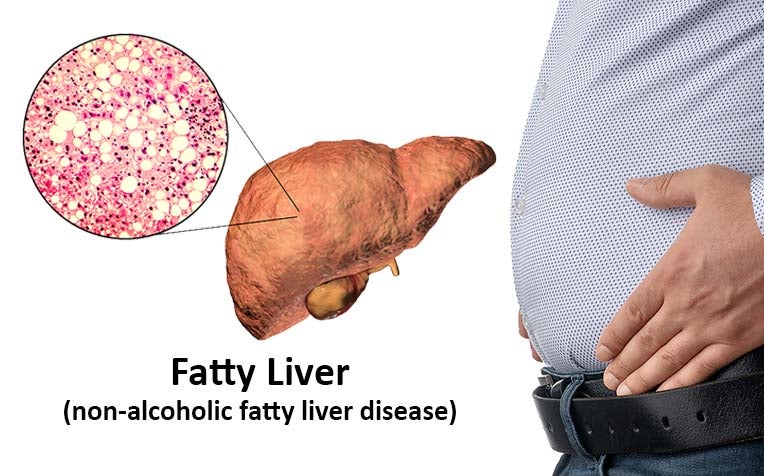
Fatty liver disease is increasingly affecting young people who drink little or no alcohol. However, the condition is reversible with lifestyle changes.
Fatty liver disease: What you need to know
Once considered a middle-aged disease associated with excessive alcohol drinking, fatty liver disease, short for non-alcoholic fatty liver disease (NAFLD), now affects more young people who drink little or no alcohol.
“The incidence of fatty liver in Singapore is increasing just like in most parts of the developed world. Many of the relatively young people whom I treat for gallstone disease also have fatty liver,” shares Professor Pierce Chow, Senior Consultant from the Division of Surgical Oncology at National Cancer Centre Singapore (SGH), a member of the SingHealth group.
The good news is a simple fatty liver condition is reversible in most cases.
However, if it is not managed properly, a fatty liver can lead to a more serious liver disease called non-alcoholic steatohepatitis (NASH) where the fatty liver becomes inflamed. This can cause liver cirrhosis (liver scarring) and
liver cancer.
Reverse fatty liver disease with lifestyle changes
Combat obesity!
As Asians have a higher risk of health problems at a lower BMI compared to Caucasians, strive to achieve a healthy BMI of between 18.5 to 22.9 kg/m2. A BMI ranging from 23.0 to 27.4 kg/m2 puts you at moderate risk for health problems, while a BMI at 27.5 kg/m2 and above puts you at high risk. Also, the ideal waist circumference cut-off for Asian men is 90cm, while for Asian women it is 80cm.Adopt a well-balanced diet
The (HPB) My Healthy Plate is a good guide to follow. Eat a quarter plate of complex carbs like oats and brown rice. Avoid refined carbohydrates. Also, eat half a plate of all kinds of vegetables. Lastly, fill the last quarter of your plate with plant-based or low-fat protein such as beans and nuts, or eat lean meat, poultry fish and low-fat dairy products.
Eliminate refined sugar from your diet completely! Drink 8 to 12 cups of water daily.Exercise more!
Exercise at least five times a week. Each session should last at least 30 to 60 minutes. It can be any form of exercise but it should at least raise the pulse rate moderately.
Exercises you can do include brisk walking (a walking pace of 1km in 10 to 15mins), badminton, cycling, swimming and table tennis.
Treatment for fatty liver disease
Treatment for fatty liver includes:
Control of diabetes, high blood pressure (hypertension), obesity, high cholesterol (hyperlipidaemia)
Medications
Management involves diagnosing and treating the underlying cause of the fatty liver disease.
“With counseling, a few of my patients became very motivated and managed to reverse their fatty liver disease through disciplined lifestyle changes,” says Prof Chow.
It is important that young people with fatty liver take steps to control their weight and glucose levels to prevent the condition from deteriorating, adds Prof Chow.
Symptoms of fatty liver disease
Early non-alcoholic fatty liver disease usually shows no symptoms. However, you may experience the following:
Tiredness
Bloatedness
Loss of appetite
Pain in the right upper abdomen
Late symptoms relate to the complications of liver cirrhosis and include nausea, jaundice, swollen abdomen and poor concentration. A fatty liver also carries a higher risk of liver failure, should surgery of the liver be required, says Prof Chow.
Causes of fatty liver disease
A fatty liver is an abnormal accumulation of fats in the liver cells.
Non-alcoholic fatty liver disease (NAFLD) is closely linked to obesity, diabetes and the metabolic syndrome, conditions which are also on the rise. Studies have shown that 80 per cent of obese people and 70 per cent of people with diabetes have fatty liver disease.
High cholesterol and high blood pressure are also correlated with fatty liver although fatty liver can be found among the young and thin with no high blood pressure.
Common causes include:
Obesity (having a BMI>25kg/m2 for Asians)
Increased belly fat (central obesity), where the waistline >90cm for Asian men or >80cm for Asian women
High cholesterol (hyperlipidaemia)
High blood pressure (hypertension)
Metabolic syndrome
Other associated conditions like obstructive sleep apnea (OSA), Polycystic Ovary Syndrome (PCOS), Underactive Thyroid (Hypothyroidism), Underactive Pituitary (Hypopituitary)
How is fatty liver diagnosed?
Fatty liver disease is diagnosed by a combination of history, physical examination, blood tests and imaging studies of the liver such as:
Liver function tests such as liver enzymes (ALT, AST) may be elevated
Ultrasound, CT or MRI scan may show fatty liver
Other blood tests may be needed to predict severity of disease or exclude other liver diseases
Liver biopsy may be required to stage the disease
Why do you need a healthy liver?
The liver, located in the right upper abdomen, is a key organ. It keeps the body in optimal health by performing metabolic and detoxifying functions.
A healthy liver regulates the amount of fat, protein and glucose in the blood. It processes nutrients from the intestines. It also removes toxins and drugs from the bloodstream.
Ref: T12
Check out other liver condition articles:
Liver Cancer: Risk Factors, Symptoms and Treatment
Liver Cancer: 5 Ways to Reduce Your Risk
Liver Cirrhosis (Liver Scarring): Causes, Symptoms and Prevention
Liver Inflammation: What Causes It and How to Prevent
Fat Buildup in the Liver: Why It's Bad for You


















 Get it on Google Play
Get it on Google Play